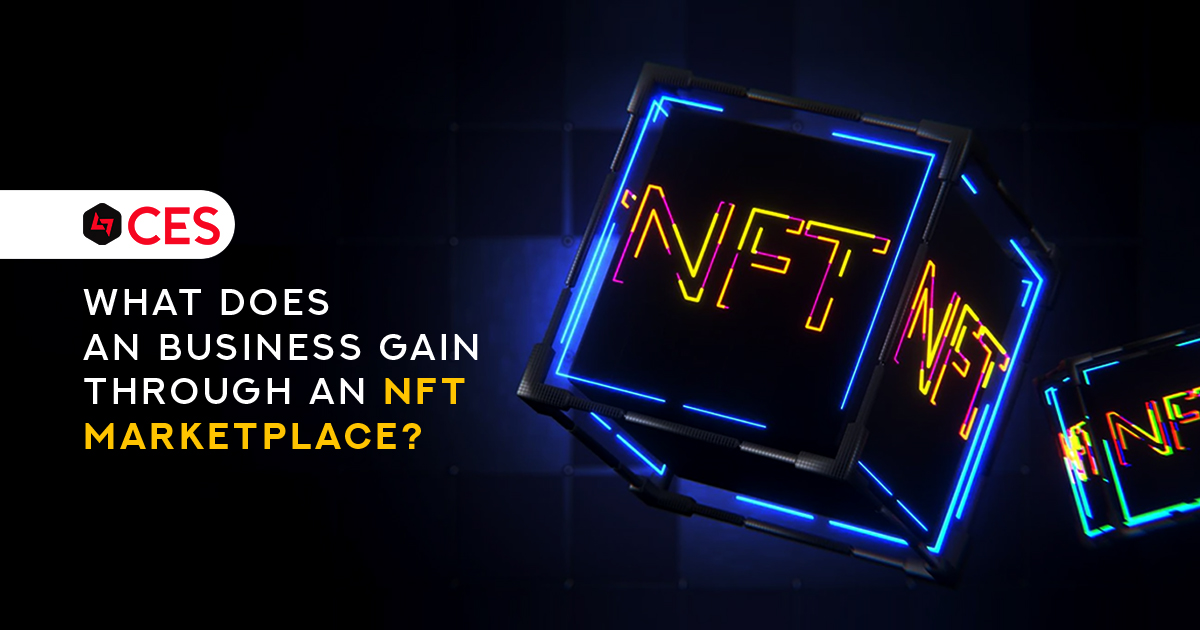Today, the NFT world has reached new heights, thanks to the 2021 crypto boom and the spread of knowledge on these tokens during the phase. Their rise to prominence also gave scope for NFT marketplace businesses to gain handsomely. While 2022 was not as great as 2021 promised it to be, NFTs still performed pretty well across the year as new use cases were discovered and features were implemented. These additions, despite facing mixed receptions, have benefited business owners. This blog elaborates on how ventures can gain from the marketplace model, with critical insights from our seasoned Web3 professionals.
NFT Marketplaces: A Recap to Be Sure
We all know that an NFT marketplace is a platform where people can create and trade NFT assets online. While these may look analogous to eCommerce stores, at first sight, there are no servers involved – only distributed ledgers are involved. Distributed ledger technology (DLT) powers the platforms for all users.
These platforms are so important that they are considered to be the businesses of the digital world, like how cryptos represent the digital world’s tenders. They can be based on vertical or horizontal commerce models selling niche NFTs or generic NFTs, respectively. They can also be integrated with other NFT applications.
Some Assets that can be Sold as NFTs
- Artworks (Physical/Digital)
- Sports Collectibles (Physical/Digital)
- In-game Assets
- Metaverse Land Plots
- Music Albums
- Photographs
- Video Clips
- Memberships
- Subscriptions
- Event Tickets
- Physical Products
- Avatars
- Profile Pictures (Generative/Hand-drawn)
These are some popular possibilities for NFTs (yes, some are so new and have the scope to witness wide adoption in the coming years) in 2022 that could thrive next year as well. But, their success depends on the functionality of the marketplace platform where they are listed and how these NFT items can be utilized by a buyer. We will see some standard features of the marketplace selling NFTs before diving into the business benefits.
Common Features Featured in a Marketplace Selling NFTs
- Storefront – It displays all information about an NFT, such as price history, ownership history, product descriptions, images, links to the sellers’ websites, and so on, for buyers to gain insights.
- Token Search – Sophisticated search engines powered by additional elements such as Filter and Sort can be utilized by users to navigate their favorite NFT collections in the marketplace within a few clicks, providing an unparalleled user experience.
- Listing Portal – A portal for listing NFT assets can be helpful for creators/sellers to mint their digital tokens and send them for moderation (by admins/smart contracts/DAO) before selling to the public.
- Purchasing Options – Buyers should be able to buy NFTs from your NFT marketplace through fixed-price sales or auctions. Sellers should have the power to choose their sale mode. Irrespective of the sale mode, the current purchase/bid status will be displayed on the application to let potential buyers know the current status.
- Web3 Wallet – A competent Web3 wallet integrated within the platform to store NFT items and crypto tokens is necessary to ease the burden off the users. It is also a good idea to allow the integration of users’ wallet accounts while creating their accounts.
- Ratings – NFT project ratings on the marketplace application enable new users to gain insights into the best-performing collections. Existing users can use them as a way to reach the seller through constructive feedback, which could be helpful for sellers to perform better in the long term.
Business Benefits an NFT Marketplace Platform Offers
- Valuable Investments – Not only investing in digital punks or apes, investing in NFT marketplace development offers more value. It is not surprising that the platform is one of the truly high ROI (Returns On Investment) providers in the Web3 space. The emergence of new blockchains in the competitive landscape only increases the scope for such platforms to thrive.
- Decentralized Core – Such marketplaces selling NFTs are typically based on blockchains that function based on Distributed Ledger Technology (DLT). The elimination of servers is a great business benefit for ventures as concerns of data theft, and security breaches will cease to exist. Nevertheless, businesses can expand extensively without being the ultimate authority holding users’ sensitive data.
- Real-world Use Cases – As we had spoken earlier, many physical items are getting tokenized on the blockchain, and use cases such as ticketing and subscriptions are taking the Web3 stage. These marketplace platforms play a central role in taking these use cases to the general public. Ventures can benefit from these making the world accept Web3 technology without skepticism.
- Power of User-Generated Content – User-generated content (UGC) has always been helpful to businesses since the Web2 days. Although it looks like only Web3 marketers benefit from these nowadays, it isn’t the case if we put some thinking into it. NFT platforms can easily garner profits through content forms created by users (the secret behind 2021’s NFT boom), including artwork, music, and videos.
How can CES be Your Partner in Developing a Novel NFT Marketplace?
If you are an aspiring Web3 entrepreneur with an aim to succeed in the virtual realm, it might just be about time you should delve into the space. At CES, we assist business owners with high dreams and planned missions to emerge victorious with our end-to-end development expertise.
Our NFT marketplace development team consists of professionals experienced in all aspects of platform development, promotions, consultation, and maintenance. Build an NFT-selling platform based on niche, or utilize one of our clone scripts based on existing ventures to propel your business forward in the Web3 realm.
Fill out the form below to begin a discussion to frame your new business platform’s development campaign with one of our seasoned campaigners!
